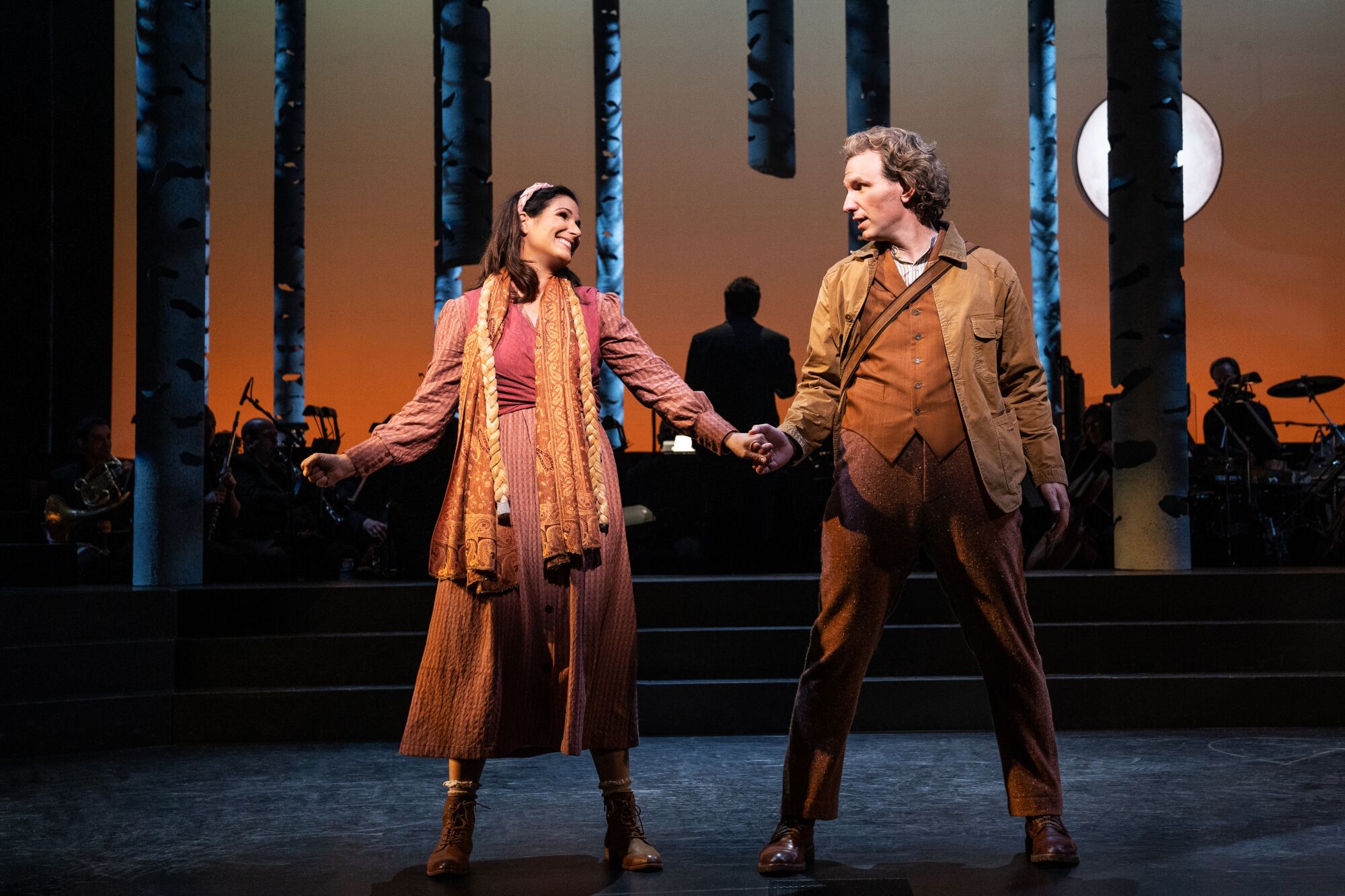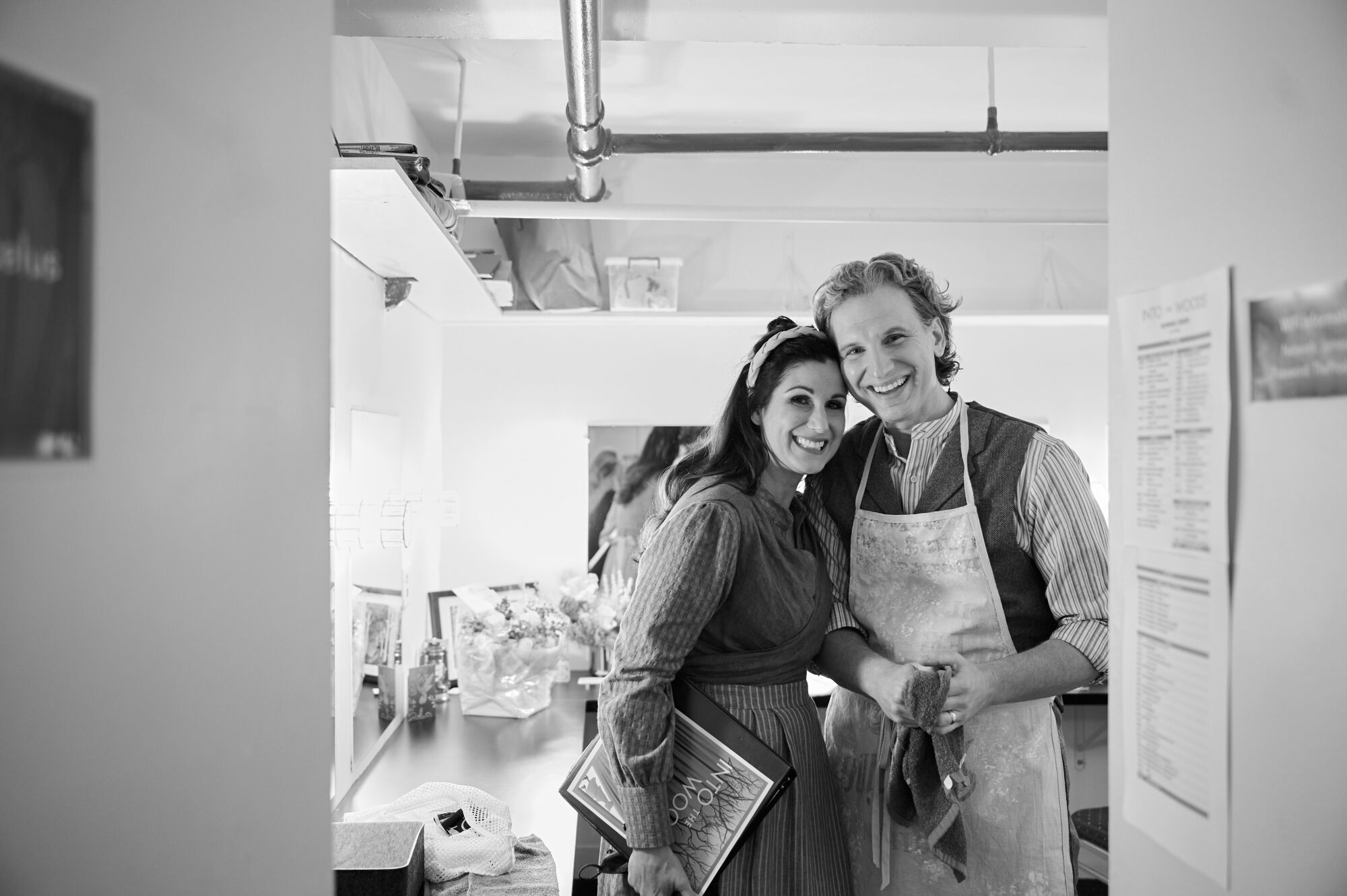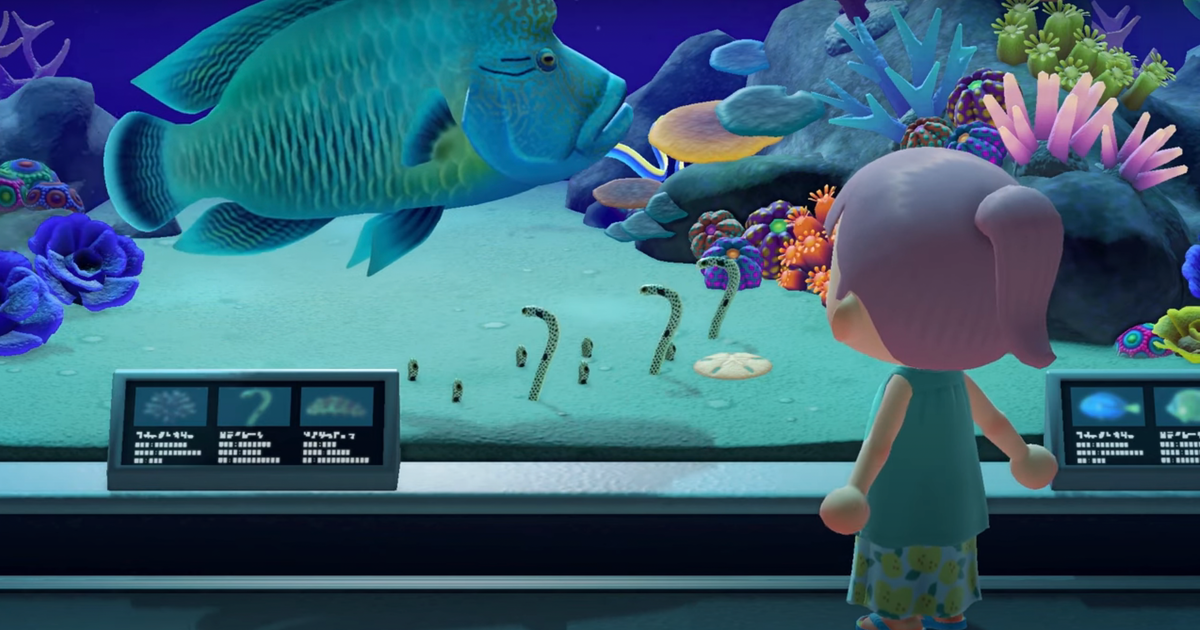During a recent performance of “Into the Woods,” Sebastian Arcelus had an idea.
“I was in the moment, I was present, I was making a bold choice and sticking to it!” he told The Times, excitedly recalling his oversized gestures and animated line delivery as the Baker. While Arcelus tried to get the audience on board, Stephanie J. Block, who plays the Baker’s Wife, whispered that the bit was too much; they then both broke character and laughed through the rest of the scene.
“We try things every single night, in front of 2,000 people — sometimes we knock it out of the park, and sometimes, it’s just terrible,” Block explained. “That’s the beauty of live theater: Let’s just go for it and see how it lands.”
The same can be said of Arcelus and Block’s rare endeavor: The two Broadway actors, married for 15 years and playing a married couple onstage, have spent the past six months on a national tour of the Stephen Sondheim musical revival, which ends its run at Los Angeles’ Ahmanson Theatre (shows start June 27).
From their home in Northern California, the two reflect on the tour that first sparked their relationship, the benefits of sharing scenes with your spouse, the complexities of traveling with their 8-year-old child and the sting of retelling a far-off fairy-tale that hits particularly close to home. The following conversation has been edited and condensed for clarity and length.
How are you feeling about wrapping up this Broadway tour together?
Block: I’m gonna make a statement: This is our last Broadway tour together. We are pooped. We knew this opportunity was going to be great but also fast-paced and extreme, and with so many variables that you cannot control when traveling with one’s family. Would you say that the three hours in the theater are probably the calmest in our day?
Arcelus: It’s probably the most predictable part of our day, which is a marathon that takes mental acuity and endurance, because we’re still tackling a pretty mammoth score and book. But we’re managing it pretty well. An important part of touring is releasing expectations.
Block: Certainly. It can get overwhelming, but if you just keep showing up the best you can to each moment and each obstacle, moving forward becomes doable. Now that we’re at the end, we’re tired, but we’re fulfilled in a way that makes the tired worth it. The experience actually fulfilled the expectation — how rare is that?
You first met on a Broadway tour. What was your first impression of each other?
Block: It was the first tour of “Wicked” in 2006. Seven weeks before the end of my year contract, company management walks in with this guy and introduces my new Fiyero. I’m wearing my green leotard and my makeup’s half done, and I’m polite and respectful, but I also realize we now have to rehearse and do a put-in [rehearsal] and everything. And Mama Elphaba was tired!
Arcelus: She was so gracious. At the end of a long tour like that, it’s a lot to reignite everything with your cast and develop a new understanding of the material as it exists between the two of you.
Block: I even said, “How is one supposed to develop chemistry with someone coming in this late?” But little by little, I recognized how extraordinary he was — as a friend, a son, a brother, a human. And him in those white pants [Fiyero wears], are you kidding me?
Arcelus: I’ll be honest, it was pretty darn immediate for me. I knew that my life had just been fully disrupted in a wonderful way. We met in Hartford, Conn., and then did [Washington,] D.C., Tampa, Fort Lauderdale and Pittsburgh, and then she left. I basically came up with every possible excuse to visit New York on every possible layoff from the tour so I could see her.
Sebastian Arcelus and Stephanie J. Block as Fiyero and Elphaba in “Wicked” on Broadway in 2007.
(Joan Marcus)
Block: Going back [with “Into the Woods”] to the Kennedy Center in Washington, D.C., where he and I did [“Wicked”] together for the first time, was so special.
Arcelus: It really was, especially as a husband and wife playing a husband and wife — roles that, long before we met, were immensely special to us. And then when you factor our own story into what this piece already is, it tethers us to these characters in ways that feel very personal. I don’t think we would necessarily have done this tour for any other show.
Block: I don’t think so either. And it came at the right time in our lives, after getting to know James Lapine as intimately as I know him now. Going through fertility issues, he was there by my side, he knows all the pains that we went through in order to conceive. Maybe the audience won’t know that backstory, but he knows that when we play the Baker and the Baker’s Wife [who try to complete quests in order to conceive a child], the way we reach an audience is different because of our life experience.
Has that experience made it tough to play these roles night after night?
Block: The only time it feels confronting to me is in the prologue, when the Witch takes her wand, points it toward the Baker’s private area, knocks it and then does this, like, touchdown dance. The audience laughs because of what they’re seeing, but I, as an actor and a woman who had a five-year difficulty of the inability to conceive, have just told the audience, “My only wish is to have a child,” and now the news that, forever, we will be barren because of the curse on our house is met with laughter.
I’d like to say I have more grace, but in that split second in minute eight of the show, it stings. It’s hard for me to compartmentalize that that is not a personal response to those of us who are walking or have walked through that particular difficulty in real life. But on the other hand, the way it infuses my storytelling is so meaningful.
Arcelus: I don’t know that we talk about these things enough — miscarriages, how each of us might blame ourselves or, in some regards, blame others or build walls in the relationship — so it’s good to address the existence of that in some way. And we bring so much of ourselves to these characters, but we also have to separate our experience from the play.
Block: Yes. We worked with [director] Lear deBessonet to make sure that the backstory of the Baker and the Baker’s Wife was not our personal story, and it’s been so helpful because what makes us right for the part can also blur and maybe derail what the material actually is. So we’re proud to retell this story, which is part of our story, but without reliving the hurt and the pain over and over again.
And now your daughter Vivienne is on this national tour with you!
Arcelus: You know, about a year ago, I asked myself, “What do I want?” The prayer was, “I want to be creatively inspired and do something special where I don’t have to leave my family.” It might not be how we envisioned it, but that prayer was answered.
Block: It really was. And 17 years after “Wicked,” this tour is a very different experience. I was a single woman in my early 30s, and I was able to just do the show eight times a week, live on my own schedule and sleep whenever I wanted. Now, married and with our 8-year-old child, her schedule, her rhythms, her needs, all of that takes precedence, period.
Arcelus: There’s so much that goes into a day before you get onstage that you carry into your performance. In our case, it’s hours of life and homeschooling and getting out into the city so that you can teach her about social studies and living history. She’s at this perfect age where she’s just old enough to digest the wealth of information that’s out there on the road, and just young enough that traveling the country with her is still manageable. When we launched the tour in Buffalo, we went up to Niagara Falls. And then we had a month in D.C. …
Block: We [visited] the White House, and she ended up in the Oval Office, opening the drawers of the Resolute desk. Seeing the Declaration of Independence and the Liberty Bell in Philadelphia, exploring Boston — this country has offered all three of us amazing, practical learning where she can read the book and then place herself in the footsteps of Paul Revere.
L.A. is like a homecoming for us, so it’ll be a lot of seeing friends and going to Disneyland and Universal Studios. But we are going to go to a [Writers Guild of America] rally and support the writers. Then we’ll probably watch “Newsies” and talk about what a strike is, and how it’s still a very effective way of making change and getting fair wages and rights for workers.
Arcelus: We’re also engaging with these cities in a way that we might not without her. I remember when I toured with “Wicked,” there were plenty of nights where I just watched two or three cycles of ESPN. She affords us that responsibility and joy.
Block: And it’s so special how the company has really embraced her, inviting her to get fairy hair extensions or see “The Little Mermaid” with them. But we do miss putting her to bed. Even after spending 10 hours with your child every single day, those two hours of bedtime rituals and saying good night every night — that’s a big loss, and we’re learning to understand what the ramifications of that might be.
Arcelus: I guess the bottom line is, you better love that show you’re doing, because it’s going to come at a cost.

Stephanie J. Block and Sebastian Arcelus in “Into the Woods.”
(Matthew Murphy and Evan Zimmerman)
What has playing these two married characters taught you about yourself or your relationship?
Arcelus: I played the Baker in college, and I gleaned hardly a percentage of what it means to me now, as a husband, as a father, as a father who’s lost a father. This time, there were discussions where, as you confront these characters, you had to do a lot of work on yourself and come to terms with generational trauma: what that means to you, what it means to these characters, how you might break it in the story and how you might not. It’s been a transformative, cathartic experience from beginning to end.
Block: The Baker’s Wife is tenacious and relentless, and for a great cause. You’re never supposed to judge your character, and I can see her point at every turn, I understand why she’s making these decisions.
Arcelus: I don’t judge him anymore, but in rehearsal, I was judging my character. I initially had a difficult time finding the goodness and value in him; he seems like this benign, scattered character who is at times so disrespectful and almost chauvinistic toward [the Baker’s Wife]. I was trying on his choices, and he was approaching things so differently than I might. It’s hard for me to yell at my wife or hold a baby carelessly. I had to be sat down and told, “He’s kind. He means to be generous. He’s a major cog in breaking the generational trauma.”
Block: Speaking of judging these characters, it’s interesting: In the Southern states, there were nights that the audiences applauded when the Baker’s Wife [meets her fate]. We’d be exiting the theater and they’d say to me, “Ah, you got what you deserved! That is correct!” Like she gets her comeuppance because of the choice she made. I’d like to have 10 minutes with those people and say, “It might have made sense [to her] in that messy and very human moment, and in those circumstances, you might make the same choice too.”
Arcelus: Right. We’re not all good, and we’re not all bad. These are complex characters, like us.
Block: Exactly. You may come in thinking you’re seeing a fairy-tale musical, and it is. You’re gonna laugh, you’re gonna have fun. But if you’re truly listening and paying attention to the underbelly of “Into the Woods,” the themes are very strong, and they’ll hit you in ways where you recognize it in yourself, your neighbor or a loved one.
Arcelus: That’s why so many performers from the Broadway company came out on tour. We weren’t done telling this story, we knew it was lightning in a bottle. Getting to live in it for the entire year has been a beautiful experience.
On this tour, you’re onstage together for three hours a day, and then you travel together, live together and raise your child together…
Arcelus: We do everything together, barring sharing a dressing room.
Block: Lovingly, I refused. Our processes are just so different. I have to get to the theater early and do a certain stretch, a certain vocal warm-up, and I love checking in with the cast, but once half-hour hits, I’m in work mode. He’s scrolling social media and answering last-minute emails before a show, and he’s probably the last one to [the] places [call to start the show] because he’s a social butterfly.
Arcelus: You know, I’m just checking in with everybody. How ya doin’? It plays right into our characters.
Block: We’re really together all day. If we look at each other and see a shift in patience in the other person, we’ll take a breath. For me, it’s a nap. Seb’s therapy is finding the local drugstore, which is exactly the same in every single town, and walking the aisles with a bag of Tostitos and a Diet Coke.
Arcelus: Sometimes you need the mundane! I used to do the Home Depot mile, just going back and forth.
Block: Because of the depth with which we know each other, we know and understand whatever happens in the course of both of our days. If I am feeling unwell, he raises me up. If he’s injured himself or if he looks at me in a certain way, I know something’s awry. There’s a lot of grace and communication — like, “I’m at 25% today, so I need you to be my 75%.”
Arcelus: And you then carry those percentages onto the stage with you; the give-and-take continues there. What a gift to be able to literally practice that in a piece like this, which is essentially about getting out of your own skin, adjusting your perspective and understanding the impact that your own life and choices has on the people around you.

Stephanie J. Block and Sebastian Arcelus backstage at the Broadway production “Into the Woods.”
(Jenny Anderson)
What advice would you give to a couple going on tour?
Arcelus: If you’re doing the show together and bringing your child, bring someone else you trust because you’ll need that extra help.
Block: Communication is everything. Be brutally honest with each other, be flexible. It’s all the big life lessons that we pose to our daughter: “You gotta roll with the punches, there’s going to be ebbs and flows, be resilient.” And as the words are streaming out of our mouths, we’re looking at each other and going…
Arcelus: “We gotta do better.”
Block: Sebastian just told Vivienne earlier today: “When I proposed to your mom, we didn’t know where we were going to go. And she said, ‘I don’t care, we could live anywhere, as long as we’re together.’”
It was a very bold and romantic promise we made to each other, but because of this tour, we get to say we actually lived it. Whatever the setting — no matter if it’s a Holiday Inn, the Ritz Carlton or an Airbnb — this family has found that if we are together, we will make it work.
‘Into the Woods’
Where: Ahmanson Theatre, 135 N. Grand Ave, L.A.
When: 8 p.m. Tuesdays-Fridays, 2 and 8 p.m. Saturdays, 1 and 6:30 p.m. Sundays. Ends July 30. (Call for exceptions.)
Cost: $40-$165 (subject to change)
Running time: 2 hours, 45 minutes, with one intermission.
Info: (213) 972-4400 or centertheatregroup.org
COVID protocol: Check centertheatregroup.org/safety for current and updated information.















